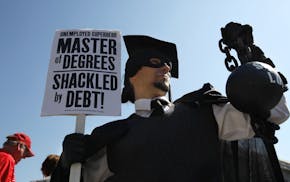When the news release crossed my desk recently about federal securities regulators filing civil charges against the promoters of St. Paul Venture Fund, Minnesota Venture Capital Inc. and Real Estate of Minnesota Inc., I assumed we had a new slate of nominees for Minnesota's financial fraud hall of fame.
And I was worried. The ballot is already lengthy, and space has gotten tighter since the judges waived the customary waiting period for Petters and Hecker. The audacity and scope of their crimes, and the fact they so quickly acquired single-name status, argued for their immediate inclusion.
But the filing of charges last week against investment adviser Jason Bo-Alan Beckman, who was accused of "serial violations of federal securities law" in connection with a $194 million currency scheme, served as a fresh reminder of how widespread financial fraud has become in Minnesota.
Our politicians may never get caught with their hands in the till, but in the blogosphere we're becoming known as the Land of 10,000 Ponzi Schemes.
Trevor Cook managed to loot $194 million from investors in just three years via a bogus currency investment scheme. Many of his 1,000 investors were recruited via a shortwave, evangelical Christian radio network. Cook, 38, was sentenced last year to 25 years in prison. End times, indeed.
Corey N. Johnston, meanwhile, did his own little bit to help destabilize the U.S. banking system. According to federal investigators, the Lakeville man defrauded 17 lenders of $80 million by selling the same loans to multiple parties. He pleaded guilty in September and is awaiting sentencing.
The customers of Charles E. Hays thought they were investing in stock index and crude oil futures, but the Rosemount trader was more interested in his own here and now. He used their life savings to pay off earlier investors and to buy himself a $4 million yacht. Hays received a 10-year prison sentence, and he and his firm, Crossfire Trading, were ordered to cough up almost $85 million in restitution and civil penalties.
Gerard F. Cellette Jr., a printing company broker from Andover, recruited people in four states to invest in $53 million worth of phony printing contracts. Go ahead, laugh, but remember that in the Petters case, supposedly sophisticated hedge funds invested in televisions that never existed. Cellette was sentenced to eight years in prison. Among the items auctioned to pay off investors: 12 go-carts, five utility trailers, six boats, five personal watercraft, three boat motors, eight snowmobiles and four all-terrain vehicles.
Forest Lake minister Neulan Midkiff may not have been the architect of a Ponzi scheme that bilked 519 people of $390 million, but he was a hardworking apostle on its behalf and was blamed for losses of $18 million. Midkiff received a 15-year prison sentence.
Kalin Dao's performance as a swindler, captured on camera and replayed in federal court, earned high praise from U.S. District Judge Joan Ericksen. "It was a masterful presentation," she said before sentencing Dao to 12 years in prison for investing $7 million in client money on her own gambling habit.
This list doesn't include assorted hangers-on and Ponzi enablers like Beckman, whom the SEC accused of raising at least $47.3 million from 143 individuals for Cook's program, of which only $8.2 million was returned to investors.
Chicago hedge fund manager Gregory Bell is serving a six-year prison term for aiding Petters. Last fall, the SEC accused two Florida-based hedge fund managers and their funds of misleading investors about the quality and status of their funds invested with Petters.
Financial scams are not a new, invasive species to our land. There was the Jerusalem artichoke mania that bankrupted hundreds of farmers and other investors, and the spectacular fraud that was Flight Transportation Corp., both in the early to mid-1980s.
We had our share of pump-and-dump penny stocks, insurance annuity schemes and rare coin come-ons through the '90s, and we ushered in the 21st century with a bombshell insider trading scheme orchestrated by George Kline, one of the state's most prominent financiers.
This incomplete accounting leads one to wonder whether there's something in Minnesota's waters that makes financial crimes more prevalent here, especially of late.
Hank Shea, a former 20-year federal prosecutor who headed the economic crimes unit in the Twin Cities, says the region has always been seen as fertile territory for scammers because so many people have quietly accumulated substantial nest eggs. One of the striking things about so many of Cook's victims is how many of them otherwise appeared to be of modest means: One worked at a water plant; another was a nurse anesthetist.
But the spike in the number of fraud cases here doesn't strike Shea as abnormally high.
"Sometimes it seems to be an epidemic, but it's not that much different than everywhere else," he said. "The downturn in the economy may have just exposed more of it."
So, I was relieved to discover that St. Paul Venture and the other two "Minnesota" companies and executives charged by the SEC actually had nothing to do with Minnesota. The companies were based in Nevada. We weren't being slimed, so much as receiving a backhanded compliment.
"Certain places, like Nevada or Boca Raton, have a reputation for scams," said Yolanda Holtzee, a Seattle-based investor who has earned a reputation for spotting some of them ahead of regulators. "So smart operators will choose a more virtuous place like Wisconsin, Iowa or Minnesota."
Maybe that explains everything.
ericw@startribune.com • 612-673-1736

Wieffering: Time to get over debit card fees
For Thrivent and others, warnings were there

With billions in sales, some co-ops are big business
